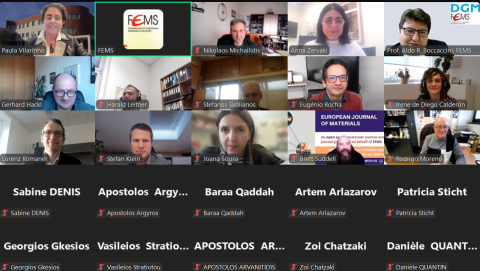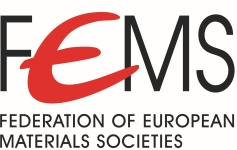Exploring the Role of Artificial Intelligence in Materials Science – FEMS Online Event Recap

On 29 January 2025, the Federation of European Materials Societies (FEMS) hosted an insightful online event exploring the intersection of Artificial Intelligence (AI) and Materials Science. The event was co-chaired by Prof Aldo R Boccaccini, FEMS President, and Dr Gerhard Hackl, FEMS Strategy Advisory Group (SAG) Chair.
Bringing together leading experts from industry and academia, the discussion highlighted AI’s transformative potential in materials research, its challenges, and the opportunities it presents for accelerating innovation in the field.
Expert Insights and Key Takeaways
The panel featured distinguished speakers:
- Assoc Prof Eugénio Rocha (University of Aveiro, Portugal)
- Dr Irene de Diego Calderón (ArcelorMittal)
- Prof Lorenz Romaner (University of Leoben, Austria)
Discussions revolved around AI’s ability to enhance efficiency, reduce costs, and accelerate product development in materials science. However, the integration of AI also raises important concerns, including ethical considerations, job displacement, cybersecurity risks, and trust in AI-generated results.
Key Challenges & Needs for AI in Materials Science
To fully harness AI's potential in the field, the speakers emphasized several critical needs:
- Robust and Reliable Data – Large, high-quality datasets are essential, ensuring accuracy, completeness, and transparency in AI-driven discoveries.
- Cross-Disciplinary Collaboration – Bridging different industrial sectors while balancing data confidentiality and open science is crucial.
- Computational Power & Advanced Algorithms – High-performance computing is needed to process complex materials data and accelerate simulations.
- AI for Fast Screening, but Experimentation Remains Essential – While AI can speed up synthesis and materials discovery, physical validation through experimentation and qualification remains indispensable.
Looking Ahead: AI in Industry Symposium at EUROMAT 2025
The event also introduced the AI in Industry Symposium, which will take place at FEMS EUROMAT 2025. This dedicated symposium will continue the conversation on AI’s evolving role in materials science, offering a platform for experts to discuss practical applications, industry adoption, and future challenges.
Spotlight on DIADEM Program
An example of AI’s impact on materials science is the DIADEM program in France. Currently supporting 17 projects, this academic initiative is focused on accelerated product development using AI, further showcasing AI’s growing role in driving innovation.
FEMS remains committed to fostering discussions on emerging technologies like AI and their influence on materials science. Stay tuned for more updates on FEMS EUROMAT 2025 and future FEMS initiatives!

